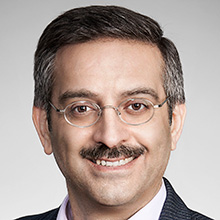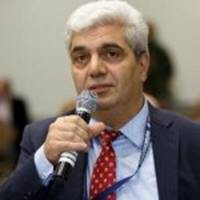Belarus and Azerbaijan Enhance Their Strategic Military Partnership[Over]
 By Fuad Shahbazov, Baku-based independent regional security and defence analyst By Fuad Shahbazov, Baku-based independent regional security and defence analyst
On November 19, Azerbaijani President Ilham Aliyev paid a long-awaited official visit to Belarus, where he met with his counterpart, President Alyaksandr Lukashenka. On this occasion, the Belarusian and Azerbaijani state news agencies praised the level of bilateral strategic cooperation, widely citing Lukashenka’s words to Aliyev: “Belarus has been waiting for you” (Belta, November 19). The Azerbaijani president’s trip to Minsk coincided with “growing frictions” between Belarus and Armenia, two formal allies within the Russia-led Collective Security Treaty Organization (CSTO). READ MORE
Iran Crisis — The First Step towards the Establishment of New Multi-layered World Order?[Over]  By Benyamin Poghosyan, PhD, Executive Director, Political Science Association of Armenia By Benyamin Poghosyan, PhD, Executive Director, Political Science Association of Armenia
The United States' decision to unilaterally withdraw from the Iran nuclear deal and re-impose sanctions on Tehran has triggered a new crisis around Iran. The Trump administration states that it does not pursue the policy of “regime change” but rather wants to get a “change of behaviour” from Tehran. However, the key American demands – withdrawal of Iranian forces from Syria, the halt of Iranian missile program and significant reduction of Iranian involvement in Iraq and Yemen – are tantamount to the capitulation. It’s obvious that if any Iranian government agrees to capitulate – that would be the shortest and safest way to domestic political turmoil which may result in regime change. READ MORE
- December 28, 2018 15:39PM
Ceasefire Violations Down as Armenia and Azerbaijan Implement South Caucasus Study Group Recommendation[Over] By EGF Editorial Staff
Since the end of October 2018, a new operative communication line (crisis hotline) has been established between Armenia and Azerbaijan, two countries that have been at war over the status of Nagorno-Karabakh (NK), a region recognized as Azerbaijani by the International Community, but inhabited by a majority Armenian population.
According to official sources from both sides, the level of military tension on the Line of Contact (LoC) between the conflicting parties has significantly decreased (from about 90 reports of ceasefire breaches/day, to about 20 reports/day). The opening of this new communication channel had been agreed several weeks before by the president of Azerbaijan, Ilham Aliyev, and the Prime-Minister of Armenia, Nikol Pashinyan, during an informal meeting held in the margins of the CIS summit in Dushanbe (Tajikistan) on 27-28 September 2018. READ MORE
- December 11, 2018 06:39AM
Tensions Rising In & Around Iran[Over]  By Benyamin Poghosyan, PhD, Executive Director, Political Science Association of Armenia By Benyamin Poghosyan, PhD, Executive Director, Political Science Association of Armenia
President Trump’s decision to pull out from the Iranian nuclear deal has significantly increased tensions in and around Iran. The return of “regime change” policy will have profound implications on Iran and the Middle East. The Iranian economy is in steep decline with the sharp devaluation of the Iranian Rial and large-scale protest rallies in different regions. The rising prices of consumer products, shortages of water and problems related with mismanagement are fuelling the protests. READ MORE
Turkey's Post Elections Policy in the South Caucasus[Over]  By Benyamin Poghosyan, PhD, Executive Director, Political Science Association of Armenia By Benyamin Poghosyan, PhD, Executive Director, Political Science Association of Armenia
Turkey's strategic alliance with Azerbaijan, trilateral co-operation including Georgia and its efforts to transform itself into a regional energy hub will continue to be the main features of the Erdogan government policy in the South Caucasus.
24 June 2018 was a big day for Turkish domestic politics. Turkey elected both the President and the Parliament. Given the sweeping constitutional changes approved in the April 2017 referendum, the new President has become an almighty figure in Turkey. Despite various assessments envisaging hard times for the incumbent Turkish President, Erdogan managed to win the race without entering into a possibly dangerous run-off. READ MORE
Is America Changing the European Power Play?[Over]  By George Vlad Niculescu, Head of Research, the European Geopolitical Forum
By George Vlad Niculescu, Head of Research, the European Geopolitical Forum
When at the NATO summit in Brussels, on 25 May 2017, president Donald Trump didn’t say that one sentence committing America to continue standing by article 5 of the NATO Charter, he raised eyebrows across Europe. At that time, everyone remembered that candidate Donald Trump raised serious suspicions that his presidency might lead to the end of the West, as we knew it. Nevertheless, everyone who has ever believed in the strength of the Trans-Atlantic link and in the soft power of the Euro-Atlantic values secretly hoped that the end of Pax Americana in Europe wasn’t that close. READ MORE
Armenia and Russia: Bottlenecks on the Way to the Future[Over]  By Nana Gegelashvili, EGF Affiliated Expert
By Nana Gegelashvili, EGF Affiliated Expert
On April 23, Armenian Prime Minister Serzh Sargsyan resigned in response to mass protests. On March 2, 2018, the presidential elections took place in Armenia. According to the amendments to the Armenian Constitution adopted at the December 6, 2015 referendum, initiated by the ruling Republican Party, the president becomes a symbolic figure, while the real power goes to the prime minister. However, despite Serzh Sargsyan’s assurances that he was not going to occupy the chair of the prime minister, the majority of voters in Armenia were confident that it was the incumbent president who would become the next prime minister, which would allow him thus to retain all the power in his hands. READ MORE
Armenia’s “Velvet Revolution” and the Karabakh Conflict Resolution[Over]  By George Vlad Niculescu, Head of Research, the European Geopolitical Forum
By George Vlad Niculescu, Head of Research, the European Geopolitical Forum
On 17 April 2018, Armenia’s National Assembly overwhelmingly voted to install Serzh Sargsyan -former president of the country- as prime minister. They unequivocally ignored the “voice of the street” calling for a change of face at the helm of this rather small, but ambitious post-Soviet state. This vote was supposed to conclude a power capture scheme started back in 2015.[…] Under pressure from independent civil society, then president Sargsyan had promised not to turn up as candidate for the prime-ministerial post. READ MORE
Endless Endgame: Whither Russia-West Confrontation?[Over]  By Elkhan Nuriyev, BREC Global Energy Associate, EGF Affiliated Expert By Elkhan Nuriyev, BREC Global Energy Associate, EGF Affiliated Expert
The world’s future is currently endangered by numerous fundamental threats, yet Western democracies fear only one – Vladimir Putin. On all geopolitical fronts of the emerging multipolar world the Russian President has smartly backlashed against all collective challenges mounted by the West. Small wonder the West’s incessant fear of Russia’s military power has made Putin the world’s most powerful man. What is currently happening in West-Russia relations is not a new Cold War; it is not even a renewed East-West divide. READ MORE
Turkey and Russia aspire to replace a century of Western domination of the Middle East[Over]  By Benyamin Poghosyan, PhD, Executive Director, Political Science Association of Armenia By Benyamin Poghosyan, PhD, Executive Director, Political Science Association of Armenia
An "Eurasianist" ideology is helping to consolidate a Russia - Turkey strategic alliance, as a viable tool to achieve long term strategic interests in the Middle East and beyond.
The security architecture of the Middle East is in the midst of a tremendous transformation. Since the end of the First World War the region has been under Western domination of some form or another. In 1920s and 1930s it was wrapped within the mandate system imposed by the League of Nations, and since the end of the Second World War the US has been the regional kingmaker. The Soviet Union had some footholds such as Egypt during Nasser's rule, as well as Syria and parts of Yemen. READ MORE
The Rationale behind Armenia-Georgia Strategic Partnership[Over]  By Benyamin Poghosyan, PhD, Executive Director, Political Science Association of Armenia By Benyamin Poghosyan, PhD, Executive Director, Political Science Association of Armenia
Since gaining independence in 1991 Armenia – Georgia relations have been characterized as friendly and mutually beneficial. Georgia is one of only two routes connecting Armenia to the world and Armenia serves as a land bridge for Georgia to Iran. The mainly positive historical memories also play a role in fomenting friendly images within both societies. […] Yet, there is a lack of clear articulation of the strategic rationale behind those bilateral relations. READ MORE
Armenia and Azerbaijan will both finalise important political transitions before the end of April[Over]  By Benyamin Poghosyan, PhD, Executive Director, Political Science Association of Armenia By Benyamin Poghosyan, PhD, Executive Director, Political Science Association of Armenia
The convergence in the timing of key political processes in Armenia and Azerbaijan has heightened interest in Armenia regarding Azerbaijan's domestic developments.
The Azerbaijani President decision to move Presidential elections from October to April 2018 caught many in Armenia by surprise. The expert community put forward several clues on potential reasons for such a decision. The most discussed option was the possible deterioration of the economic situation in Azerbaijan in the second half of the year, which theoretically may complicate the re-election of Aliyev. READ MORE
Raising Tensions Around Iran: Should Armenia be Concerned?[Over]  By Benyamin Poghosyan, PhD, Executive Director, Political Science Association of Armenia By Benyamin Poghosyan, PhD, Executive Director, Political Science Association of Armenia
In recent months Iran has been facing both internal and external challenges. The wave of demonstrations shook up the Islamic Republic in late December – early January 2017-2018. The expert community still has contradicting views for the main reasons of the protest movement: internal struggle between conservatives and reformists, outside meddling with main arrows targeting the US, Israel and Saudi Arabia as potential sponsors, spontaneous movement based on economic hardships and rampant corruption. READ MORE
Is Russia’s Containment Still Possible? Case-study on the South Caucasus[Over]  By Benyamin Poghosyan, PhD, Executive Director, Political Science Association of Armenia By Benyamin Poghosyan, PhD, Executive Director, Political Science Association of Armenia
Since 2014, the containment of Russia has been one of the most popular topics within the expert community dealing with Geopolitics and Geostrategy. This term has been actively used by the Western political circles, including high level state officials and senior leaders of NATO. The Russian officials also use this term to describe Western, and, in particular, US policy towards Moscow. However, despite emphasizing the necessity to contain Russia in the post-Soviet space, including in the South Caucasus, little if anything is being done to change the geopolitical status quo. READ MORE
- February 20, 2018 07:58AM
The Western Confrontation with Russia: Scenario Planning in the Area from the Baltic Sea to the Wider Black Sea [Over]  by George Vlad Niculescu, Head of Research, the European Geopolitical Forum
by George Vlad Niculescu, Head of Research, the European Geopolitical Forum
Over the last few years, the confrontation between Russia and the West has made the headlines of plenty of academic and media analysis. Not surprisingly, the countries in-between located at the epi-center of this confrontation have been struggling to re-balance their positions against Washington, Brussels, and Moscow. What scenarios would most accurately outline the future of this confrontation in the geopolitical area between the Baltic Sea and the Wider Black Sea? READ MORE
- February 10, 2018 07:36AM
Armenia’s U-turn back to ‘multi-vector foreign policy’[Over]  By Stepan Grigoryan, Head, Analytical Centre for Globalisation and Regional Cooperation, Armenia
By Stepan Grigoryan, Head, Analytical Centre for Globalisation and Regional Cooperation, Armenia
The statement from the President of Armenia in September 2013 sounded like a bolt from the blue. He would not sign the Association Agreement with the European Union at the planned November Eastern Partnership Summit in Vilnius, he said. Instead, Armenia would be joining the Russian led Eurasian Economic Union (EAEU). This signified Armenia's departure from a multi-vector foreign policy. READ MORE
Everyone is happy with the new Armenia-Russia-EU threesome[Over]  By Benyamin Poghosyan, PhD, Executive Director, Political Science Association of Armenia By Benyamin Poghosyan, PhD, Executive Director, Political Science Association of Armenia
Armenia, the European Union and Russia had more to gain than lose from the signing of the new Armenia - EU enhanced co-operation agreement. Paradoxically Armenia's membership of the EAEU was transformed from a liability into an asset during Yerevan's second attempt at negotiations with the EU.
On November 24, 2017 Armenia and EU signed a Comprehensive and Enhanced Partnership Agreement (CEPA) during the Eastern Partnership Brussels summit. The negotiations were launched in December 2015, and the agreement was initialled in March 2017. This was the second attempt to sign a new agreement between Armenia and EU. In 2010 – 2013, negotiations were held to elaborate an Association Agreement (AA), including the establishment of the Deep and Comprehensive Free Trade Area. READ MORE
- December 18, 2017 21:58PM
An Armenian-Georgian strategic relationship can help both countries face geo-political challenges[Over]  By Benyamin Poghosyan, PhD, Executive Director, Political Science Association of Armenia By Benyamin Poghosyan, PhD, Executive Director, Political Science Association of Armenia
Georgia and Armenia need to develop a strategic relationship in order to see off a number of geo-political challenges.
Armenia and Georgia are both facing tough foreign policy challenges. Armenia has to deal with constant, joint, Azerbaijani-Turkish pressure over the Nagorno-Karabakh conflict. Another hard task is the effort to develop relations with the Euro-Atlantic institutions, whilst simultaneously not jeopardizing strategic relations with Russia. The alliance with Moscow is itself a challenge given Armenia's overdependence on Russia, and Russia's growing cooperation with Turkey and Azerbaijan. READ MORE
- November 29, 2017 19:07PM
Armenia, Georgia, Azerbaijan: Foreign Policy Opportunities and Challenges[Over]  By Benyamin Poghosyan, PhD, Executive Director, Political Science Association of Armenia By Benyamin Poghosyan, PhD, Executive Director, Political Science Association of Armenia
All three internationally recognized republics of the South Caucasus – Armenia, Azerbaijan and Georgia - are facing hard challenges in pursuing their foreign policies. They have to take into account contradicting/coinciding interests of regional and global actors involved in the region. The main purpose of this article is to analyze the main challenges and opportunities of Armenian, Georgian and Azerbaijani foreign policies with a focus on their interactions with Russia and the West. READ MORE
- November 22, 2017 05:34AM
US-Russia Relations: Implications for the South Caucasus[Over]  By Benyamin Poghosyan, PhD, Executive Director, Political Science Association of Armenia By Benyamin Poghosyan, PhD, Executive Director, Political Science Association of Armenia
As the US and Russia compete and maneuver for advantage in the arena of international politics, those nations connected to each are often affected by their shifting relations. The main purpose of this article is to analyze the dynamics of US–Russia relations and their implications for the South Caucasus. Since late 2011, US–Russia relations have deteriorated sharply and entered an acute crisis phase in spring 2014. READ MORE
Kurdish referendum has wide regional implications[Over]  By Benyamin Poghosyan, PhD, Executive Director, Political Science Association of Armenia By Benyamin Poghosyan, PhD, Executive Director, Political Science Association of Armenia
The 25 September referendum in the Kurdish region may not lead to Kurdish independence any time soon, but neighbouring countries are apprehensive.
On September 25, 2017 the long-anticipated independence referendum took place in the region administered by the Kurdistan Regional Government (KRG), and other mainly Kurdish populated disputed areas of Iraq. Those areas are outside of KRG administered boundaries defined by the Iraqi constitution, but currently are under control of Kurdish Peshmerga fighters. According to preliminary official results voting turnout was 72 percent and approximately 93 percent of participants voted for independence. READ MORE
Relations with China may help Armenia reduce its dependence on Russia[Over]
 By Benyamin Poghosyan, PhD, Executive Director, Political Science Association of Armenia By Benyamin Poghosyan, PhD, Executive Director, Political Science Association of Armenia
China's growing involvement in the South Caucasus may provide Armenia a much needed flexibility in its foreign policy.
On August 9, 2017 work started on the construction of China's new Embassy building in Yerevan. Armenian Foreign Minister Edward Nalbandian, Yerevan's Mayor Taron Markarian, and visiting Chinese Assistant Foreign Minister Li Huilai participated in the ground-breaking ceremony of the 40,000-square-meter embassy compound that should be completed by the end of 2019. READ MORE
- September 5, 2017 06:41AM
Armenia's Russian Hug[Over]
 By Benyamin Poghosyan, PhD, Executive Director, Political Science Association of Armenia By Benyamin Poghosyan, PhD, Executive Director, Political Science Association of Armenia
Russia effectively uses the complicated geopolitical situation of Armenia to strengthen its grip on Yerevan, and uses its alliance with Armenia as an efficient tool to further its position in the South Caucasus.
Alliance with Russia is the cornerstone of Armenian foreign and security policy. Armenia is a member of the Collective Security Treaty Organization, the Russia-led military block comprising six former Soviet republics. A Russian military base is deployed in Armenia, and will be there at least until 2044. Armenia has a joint air defense system with Russia, and in 2016 the two countries formed a joint military force. READ MORE
The South-West Transport Corridor Project and the Geopolitical Reshaping of the South Caucasus[Over]
 By Fuad Shahbazov, Expert-advisor, Center for Strategic Studies under the President of the Azerbaijan Republic By Fuad Shahbazov, Expert-advisor, Center for Strategic Studies under the President of the Azerbaijan Republic
Baku hosted the first joint gathering of the heads of the railway administrations of Iran, Azerbaijan, Georgia, Ukraine and Poland, on June 19. The meeting was dedicated to the newly-launched “South-West Transport Corridor,” which links into the broader Trans-Caspian International Route project launched in 2016. READ MORE
|
|